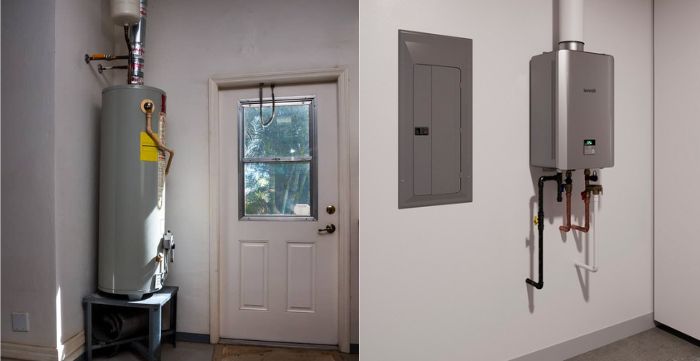
The debate between tankless water heaters and traditional water heaters is an ongoing one in the Columbus, OH area. Homeowners must decide which type of water heater is best for their home, based on their budget, available space, and energy efficiency needs. In this blog post, we will look at the pros and cons of traditional and tankless water heaters in Columbus, OH so that homeowners can make an informed decision about which type of water heater is best for them.
Tankless Water Heaters: Pros
- Energy Savings: One of the main benefits of tankless water heaters is their energy efficiency. Unlike traditional water heaters, which keep a large amount of hot water stored in a holding tank at all times, tankless water heaters only heat the amount of water that you need for your household tasks when it is requested. This means that you will use less energy over time and therefore save money on your utility bills each month.
- Long Lasting: Tankless Water Heaters have a much longer lifespan than traditional storage tanks because they don’t suffer from negative effects like corrosion or mineral build up due to heated standing water inside the unit. When properly maintained and serviced annually, tankless units can last up to 20 years, which is much longer than the lifespan of a traditional water heater.
- Space Saving: Tankless Water Heaters take up much less space in your home than traditional storage tanks because they are typically small wall-mounted units and do not require additional floor or basement space for installation. This can be especially useful for homeowners who have limited available space in their homes or garages.
Tankless Water Heaters: Cons
- Initial Cost: The initial cost of tankless water heaters is often higher than that of traditional models because they are more complex systems with sophisticated technology and components to install. However, these upfront costs can be offset by energy savings over time if you choose to go with a tankless system.
- Installation: Tankless water heaters must be professionally installed by a qualified technician in order to ensure that the unit is functioning properly and efficiently. This can add to the installation cost but it is worth it since a tankless system needs to be correctly wired, vented and connected to your home’s plumbing in order for it to work properly.
- Hot Water Output: The hot water output of a tankless water heater may not be enough for larger households with multiple bathrooms or for homes located in colder climates where more hot water is needed throughout the year. If you need more than 2-3 showers per day or will have large gatherings of people using hot water at once, you may want to consider a traditional water heater with a larger storage tank.
Traditional Water Heaters: Pros
- Upfront Cost: Traditional water heaters are more affordable upfront than tankless models because they are simpler systems that don’t require as much setup and installation time. This can be a great benefit for homeowners who have limited budgets but still need hot water in their homes.
- Hot Water Output: Traditional water heaters can provide much higher hot water output than tankless models due to the large capacity tanks they use to store heated water at all times. This makes them ideal for larger households or those located in colder climates where more hot water is needed throughout the year.
- Easy to Install: Traditional water heaters are much easier to install than tankless models because they don’t require as many components or complex wiring. As long as the unit is properly sized for your home, it can usually be installed in just a few hours by a qualified technician. If you need services like gas water heater repair in Reynoldsburg, OH, you can contact a local plumber to help.
Traditional Water Heaters: Cons
- Energy Use: Traditional water heaters rely on stored hot water that is constantly being reheated throughout the day which leads to higher energy usage and bills. For this reason, traditional water heaters may not be the best option for those who are looking to save money on their monthly utility costs.
- Maintenance: Over time, sediment and minerals can build up in traditional water heater tanks which can lead to problems like corrosion and even tank failures. To avoid this, traditional water heaters need to be regularly serviced and flushed to keep them functioning properly.
- Lifespan: The lifespan of a traditional water heater is typically much shorter than that of a tankless system due to the effects of standing hot water on metal components inside the tank. Traditional water heaters usually last for about 10 years if they are well maintained, but this may vary depending on how often you use your unit and the quality of its components.
Conclusion
Overall, each type of water heater has pros and cons that should be taken into consideration when selecting one for your Columbus, OH home. Tankless systems are more expensive upfront but can save you money in the long run with their energy efficiency and longer lifespans. Meanwhile, traditional water heaters are more affordable upfront but require regular maintenance and higher energy bills to operate.
By weighing all of your options, you can make an informed decision about which type of water heater is right for your home and budget. Contact Ohio Water Heaters at (614) 327-6971 to learn more or book an appointment!
Leave a Reply